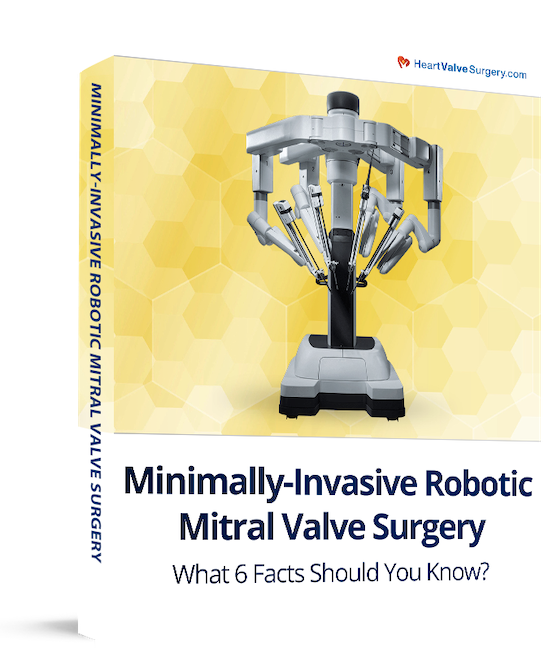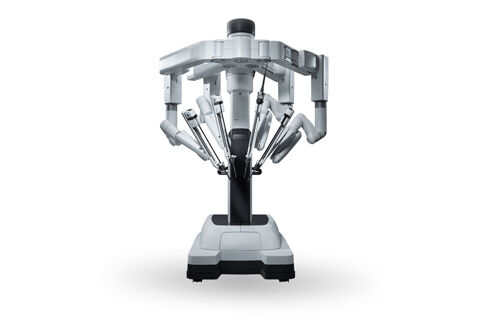What Should You Know About Robotic Mitral Valve Surgery?
Patients with mitral valve disease may be candidates for minimally-invasive robotic surgery at leading cardiac centers.
What Should You Know About Robotic Mitral Valve Surgery?
Patients with mitral valve disease may be candidates for minimally-invasive robotic surgery at leading cardiac centers.
“Robotic mitral valve surgery gets my patients great outcomes with the fastest recovery.”
-- Dr. Marc Gillinov, Chairman of the Department of Thoracic and
Cardiovascular Surgery at the Cleveland Clinic, Cleveland, Ohio
-- Dr. Marc Gillinov, Chairman of the Department of Thoracic and Cardiovascular Surgery
at the Cleveland Clinic, Cleveland, Ohio
Patients diagnosed with mitral valve disease need to understand the symptoms, the risks and their treatment options. In this video, Dr. Marc Gillinov and Dr. Tarek Malas, leading robotic surgeons at the Cleveland Clinic, answer 5 important questions about the use of minimally-invasive robotic surgery to treat patients with mitral valve disease.
“I couldn’t believe it. I was back to work 7 days after my robotic mitral valve surgery.”
-- Leila Saeid, Mitral Valve Surgery Patient
-- Leila Saeid, Robotic Mitral Valve Surgery Patient
Minimally-invasive robotic mitral valve surgery has been helping patients return to active living with a normal life expectancy since 2002. Watch this special video featuring Leila Saeid, a robotic mitral valve patient of Dr. Joanna Chikwe, the Chair of Cardiac Surgery at Cedars-Sinai, to learn the advantages of robotic mitral valve surgery.
Who Can Get Robotic Mitral Valve Surgery?
Discover which patients are eligible for robotic mitral valve surgery from Dr. Husam Balkhy, Director of Robotic and Minimally Invasive Cardiac Surgery at University of Chicago Medicine. In this video, Dr. Balkhy explains how he uses the robot to treat mitral valve disease, atrial fibrillation, coronary artery disease, and other cardiac conditions.
Find Experienced Robotic Mitral Valve Surgeons
Robotic mitral surgery is a specialized form of cardiac surgery that is only performed at cardiac centers that have dedicated teams for the utility of this complex minimally-invasive approach.
Advantages of Robotic Mitral Valve Surgery
In this special video, Dr. Vinay Badhwar, the Executive Chair at West Virginia Heart & Vascular Institute, reveals the important advantages of robotic mitral valve surgery for patients and their medical teams.
Top 3 Misconceptions of Robotic Mitral Surgery
Many patients are often confused about robot-assisted mitral valve surgery. In this video, Dr. Arnar Geirsson, Director of the Surgical Heart Valve Program at NewYork-Presbyterian Columbia University Irving Medical Center, addresses the common misconceptions about robotic heart surgery.
My 15-Year Experience Performing Robotic Mitral Valve Surgery
Dr. Thomas Molloy at Adventist Health Northwest Heart Center has spent over 15 years focusing on robotic mitral valve surgery for patients needing mitral valve repair and mitral valve replacement. What are the critical insights that patients can learn from Dr. Molloy about robotic mitral valve surgery? Find out in this special interview with Dr. Molloy.
Free Patient eBook
To learn more about robotic mitral valve surgery, click here to download our new Free eBook, “Robotic Mitral Valve Surgery: What 6 Facts Should You Know?” You can share this eBook with your family and friends.

Questions & Answers About Robotic Mitral Valve Surgery
Question 1: Is robotic mitral valve surgery approved by the FDA?
Answer: Since 2002, the U.S. Food and Drug Administration (FDA) has approved robotic mitral valve surgery as a safe-and-effective therapy for the treatment of patients with mitral valve disease.

Question 2: Are the patient’s anatomy, body type, weight and cardiac function key criteria for evaluating the use minimally-invasive techniques including robotic mitral valve surgery?
In this video, Dr. Kevin Hodges answers important patient questions about patient criteria used to evaluate the utility of robotics to perform mitral valve surgery.
Question 3: Is robotic surgery possible for mitral valve replacement?
Thanks to new advances in mitral valve replacement devices, the use of minimally-invasive robotics can be used to replace a defective mitral valve. Watch this educational video with Dr. Robert Smith II, the Chairman of Cardiovascular Surgical Services at Baylor Scott & White The Heart Hospital - Plano, to learn about this exciting new technology.
Question 4: Can complications during a robotic procedure cause a minimally-invasive robotic mitral valve surgery to be converted to an open-chest sternotomy?
Watch this video with Dr. Kevin Hodges, a leading minimally-invasive and robotic mitral valve surgeon, who addresses this important question about converting a robot-assisted operation to a sternotomy due to complications.
